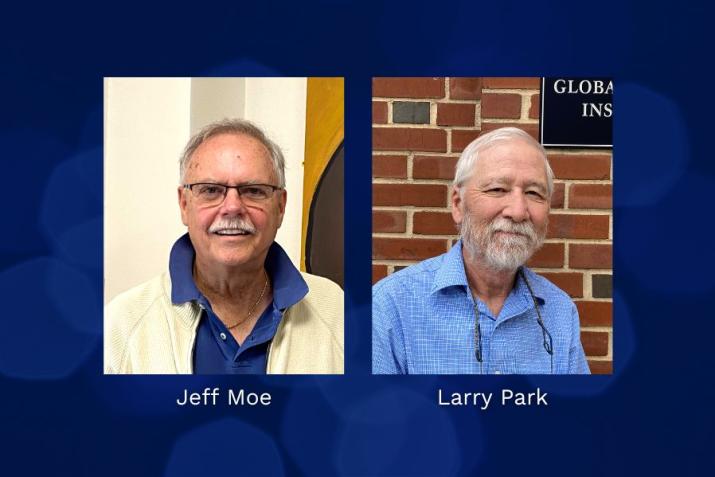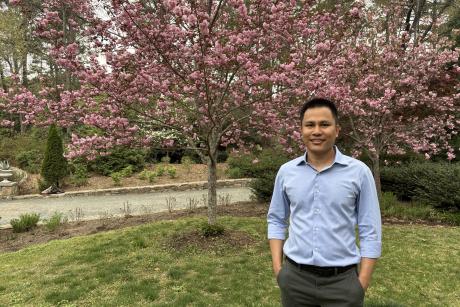Even in the midst of the COVID-19 pandemic, when Trent Hall was quiet and lifeless, Jeffrey Moe, Ph.D, could count on finding a colleague a few office doors away. Larry Park, Ph.D, an associate professor of medicine and global health, also came in on most days.
“We were here a lot, wore masks and socially distanced,” says Moe, an adjunct professor who joined DGHI’s faculty in 2014. “It’s interesting and ironic that the two of us who were here the most are going to be gone.”
Moe and Park will retire from DGHI this summer after a combined 19 years at the institute. Moe’s work primarily focused on neglected tropical diseases and treatment. He wrote an influential paper in 2006 that led to the FDA’s approval of the priority review voucher (PRV) to reward new therapeutics and diagnostics for those diseases. Park’s work focuses on respiratory disease, HIV and Hepatitis C infection and their effect on other conditions and healthcare costs.
We spoke with Park and Moe about their favorite Trent Hall memories, lessons they’ve learned and what’s next for them as they begin new chapters.
Larry Park
What is a lesson your work has taught you through the years that still resonates today?
You need collaborators to make research work. Also, you need colleagues to provide expertise in various areas, in-country collaborators for overseas studies and a great staff and students. For the latter, we’re training the next generation of researchers, policy makers, etc. to push the field along. They’re also much better at adapting to new technologies that make research better and easier.
Is there a quote or phrase that guides your approach to work?
“All models are wrong, some are useful,” an aphorism by statistician George E. P. Box. This has stuck with me since a statistician colleague mentioned it in a lecture at Johns Hopkins University. I take it to mean that what we think we know is not the whole truth, but it often works. I tell my students to be skeptical and don’t believe your first impression of what you see in published literature, but especially not in their own study results. I apply this idea particularly to data, which are never “clean” despite what people will tell you.
Your favorite memory about working in Trent Hall?
The people – staff, colleagues, and in particular, the students. Before COVID, Trent was a vibrant building of wonderful people. We’d have great conversations about life and work. We’re a community working toward the same goals of improving health, equity and inclusion around the world.
What’s next for you after your last day at DGHI?
I’ll play some tennis, get back in aerobic shape on my bicycle, cook some interesting food and take a few deep breaths to relax. The week after that, I have not a clue. Something interesting though.
What will you miss most about your work with DGHI?
Students!
Jeffrey Moe
What is a lesson your work has taught you through the years that still resonates today?
Persistence. And sometimes, things that are obvious aren’t obvious to other people such as in my work, there was an obvious problem with “neglected diseases” [because of their description].
There are some hard rules of economics that if there isn’t a way to get a return on your investment, make a small investment with low or no return. We had to come up with a novel solution to change that. So, persistence, and everyone involved with this – government, private and public sector – has their view of what the problem is and what will be a great solution. The beginning of the idea is suspending your assumptions, take fresh eyes to the problem and compromise. I’ve been working on new incentives for neglected diseases for 21 years.
Do you have a phrase you quote often?
It’s a tortured phrase: “The path to getting there are the qualities of being there.” It’s an anonymous quote. This suggests that you may not be able to say what the direction is, but the path is the qualities. If you hold these truths and behave in these ways, the path emerges out of those qualities and getting there isn’t so directional.
Your favorite memory about working in Trent Hall?
I love our old building, and it has great bones. What I love is I can walk down the hall and find expertise in almost any area of disease and different disciplines. This institute isn’t single discipline, its cross-disciplinary.
What’s next for you after your last day at DGHI?
This past spring, I retired from teaching, but I’m continuing to do research. I’m in conversation with DGHI leadership about how I can still be helpful to [the institute], the faculty and the department. I’m sort of the “old statesman,” someone with 20 years of knowledge wanting to help.
What will you miss most about your work with DGHI?
It’s fun to teach students. Students are energizing. They ask good questions, and there’s nothing more humbling than when somebody asks you to explain something that you think you understand. Then, you have to take it a part, think about it again and find how to explain it better. And I’ll miss the faculty meetings because they’re interesting and give an opportunity to learn something new. Also, I’ll miss seeing faculty that taught the same courses I did.



